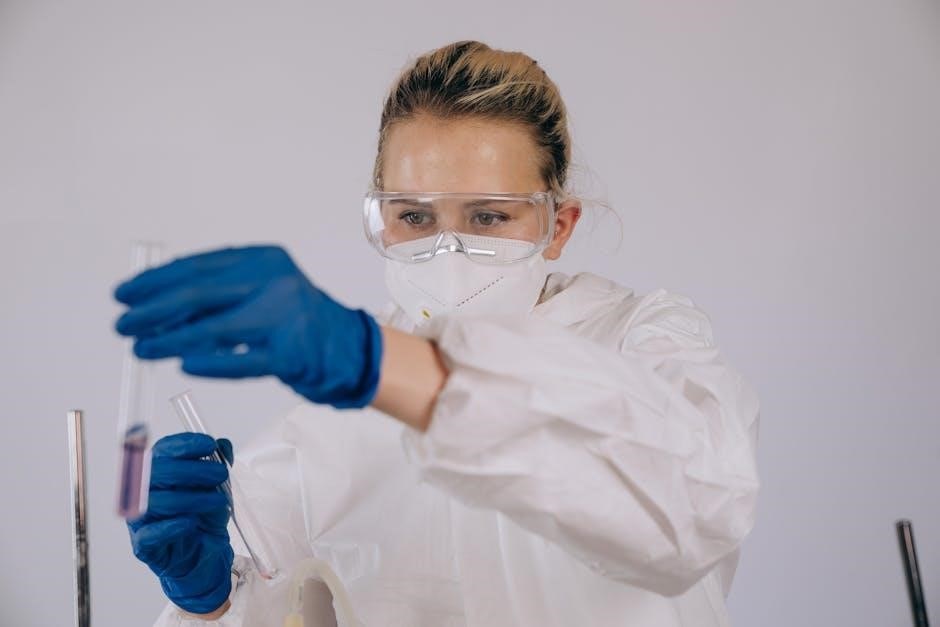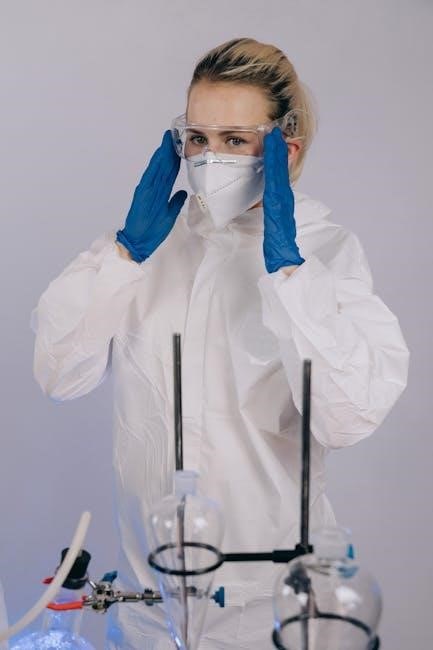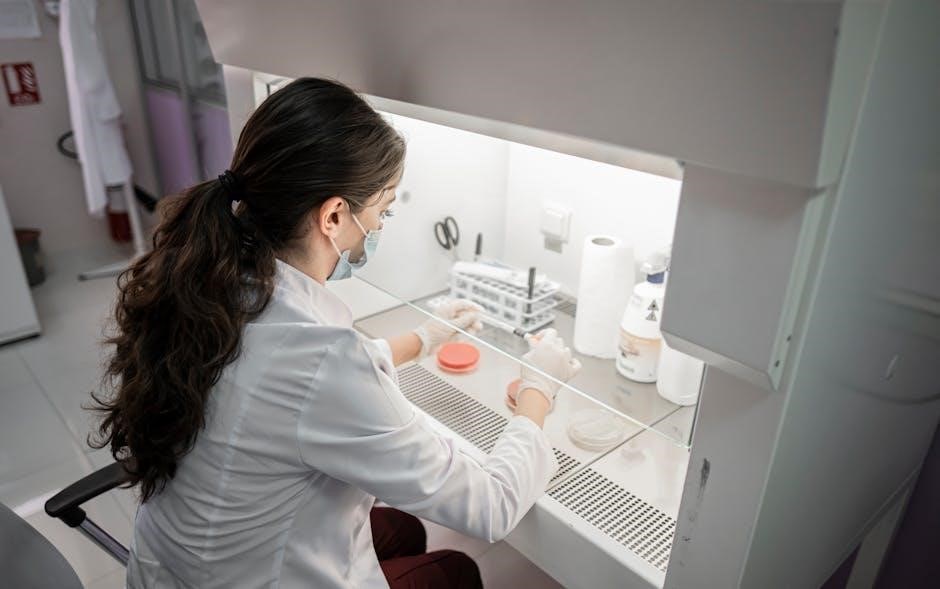Understanding the AP Biology Unit 1 Test
The AP Biology Unit 1 test assesses foundational concepts, including scientific inquiry, lab investigations, and biological theories. It evaluates critical thinking and data analysis skills, setting the foundation for the course.
Key Concepts Covered in Unit 1
Unit 1 of AP Biology focuses on foundational biological concepts, including scientific inquiry, experimental design, and data analysis. Key topics include the scientific method, lab techniques, and interpreting experimental results. Students explore biological theories such as evolution, natural selection, and cellular structure. The unit also covers scientific literacy, ethical considerations, and the role of biology in society. Understanding these concepts is crucial for mastering subsequent units and excelling on the AP exam.
Importance of Unit 1 in AP Biology
Unit 1 lays the groundwork for success in AP Biology by introducing fundamental concepts and skills. It emphasizes scientific inquiry, critical thinking, and data interpretation, which are essential for higher-level topics. Understanding these basics ensures a solid foundation for tackling complex subjects like cellular respiration and genetics later in the course. Additionally, Unit 1’s focus on experimental design prepares students for lab-based assessments and fosters problem-solving abilities. Mastery of Unit 1 not only enhances academic performance but also builds the analytical skills necessary for success on the AP exam and in future scientific pursuits.

Preparing for the AP Biology Unit 1 Test
Effective preparation involves tailored study plans, active learning, and regular practice with past papers to build confidence and mastery of key concepts.
Study Strategies for Success
To excel in the AP Biology Unit 1 test, adopt a structured study approach. Begin by creating a detailed study plan, focusing on weak areas. Engage in active learning by summarizing key concepts in your own words. Utilize practice tests to identify gaps in knowledge and refine your understanding. Dedicate time to reviewing lab investigations and scientific inquiry methods. Incorporate flashcards for memorizing biological theories and models. Regularly review class notes and textbook chapters, highlighting critical points. Join study groups to discuss complex topics and clarify doubts. Lastly, ensure adequate sleep and nutrition to maintain cognitive performance. By combining these strategies, you can build a strong foundation for success.
Using Practice Tests Effectively
Practice tests are a powerful tool for preparing for the AP Biology Unit 1 test. Start by simulating exam conditions, such as timing yourself and minimizing distractions. Complete full-length practice tests to build stamina and familiarize yourself with the question format. After each test, review your answers thoroughly, focusing on incorrect responses to identify knowledge gaps. Use the results to refine your study plan, targeting areas where improvement is needed. Regularly track your progress to monitor growth and adjust your strategies. Additionally, analyze the types of questions that appear frequently to prioritize your study efforts. By consistently using practice tests, you can enhance your problem-solving skills and confidence, ensuring a stronger performance on the actual exam.
Time Management Tips
Effective time management is crucial for success on the AP Biology Unit 1 test. Allocate your study time wisely, focusing on weak areas identified through practice tests. Create a detailed study schedule, ensuring regular breaks to prevent burnout. During the test, read each question carefully and prioritize answering those you find easiest first. Allocate about one minute per multiple-choice question and more time for free-response questions. Avoid spending too long on a single question, as this can impact your ability to complete the entire test. Practice time management during study sessions to build efficiency and composure. By managing your time effectively, you can approach the test with confidence and maximize your score.

Resources for AP Biology Unit 1
Utilize online study guides, lab manuals, and practice tests to reinforce Unit 1 concepts. Websites like Khan Academy and College Board offer valuable resources for targeted preparation.
Best Online Study Guides
Khan Academy, College Board, and BiologyCorner offer comprehensive online study guides for AP Biology Unit 1. These resources provide detailed explanations, practice questions, and interactive activities to help students master foundational concepts like scientific inquiry, biological theories, and experimental design. Khan Academy’s video tutorials and practice exercises are particularly effective for visual learners. College Board’s official resources ensure alignment with exam content, while BiologyCorner’s study notes and flashcards aid in targeted review. Additionally, online forums and study groups can connect students globally, fostering collaborative learning.
Recommended Lab Manuals
For AP Biology Unit 1, the officially recommended lab manuals include the AP Biology Teacher Lab Manual and Investigative Labs: An Inquiry-Based Approach. These resources provide detailed experiments, procedures, and data analysis exercises aligned with course standards. The Teacher Lab Manual offers comprehensive guidance for instructors, while Investigative Labs focuses on student-centered, hands-on learning. Additionally, the AP Biology Investigative Labs manual emphasizes real-world applications and scientific inquiry. These manuals are essential for mastering lab investigations, experimental design, and data interpretation, all of which are critical for success on the Unit 1 test. They also align with the College Board’s curriculum framework, ensuring students are well-prepared for exam questions related to lab-based content.
Where to Find Reliable Practice Tests
Reliable AP Biology Unit 1 practice tests can be found through official College Board resources and reputable online platforms. The College Board offers past exam questions and practice tests on their website, ensuring alignment with exam format and content. Additionally, websites like Khan Academy and Varsity Tutors provide free practice materials tailored to AP Biology. Commercial test prep companies, such as Princeton Review and Kaplan, also offer comprehensive practice tests with detailed explanations. For Unit 1-specific practice, the AP Biology Unit 1 Practice Test PDF is widely recommended, featuring 34 multiple-choice questions and a detailed answer key. These resources help students familiarize themselves with test structure, timing, and question types, making them indispensable for effective preparation.

Mastery of Unit 1 Topics

Mastery of Unit 1 topics requires a deep understanding of scientific inquiry, biological theories, and practical applications, such as the structure and function of cells. Students should focus on active learning techniques and regular practice to grasp complex concepts effectively.
Key Biological Theories and Models
Key biological theories and models in Unit 1 form the foundation of AP Biology, including the structure and function of cells, transport mechanisms, and energy transformations. Students must grasp concepts like the cell theory, photosynthesis, and cellular respiration. Understanding scientific inquiry and experimental design is crucial, as these theories are applied in lab investigations. Models such as the fluid mosaic model of cell membranes and the Calvin cycle in photosynthesis are essential for visualizing complex processes. Mastery of these theories and models enables students to analyze biological systems and interpret experimental data effectively, preparing them for higher-level topics in the course.
Lab Investigations and Data Analysis
Lab investigations are central to AP Biology, fostering hands-on learning and critical thinking. Unit 1 emphasizes scientific inquiry, experimental design, and data interpretation. Students analyze biological phenomena through experiments, such as osmosis, photosynthesis, and enzyme activity. Data analysis involves graphing, identifying patterns, and drawing conclusions. Accuracy in measurements and proper use of lab equipment are stressed. These skills prepare students for real-world scientific research and problem-solving. Understanding experimental design helps students evaluate variables and validity. Lab reports and presentations reinforce communication of findings. Mastery of these skills is essential for success in Unit 1 and beyond, as they form the basis for advanced biological studies and practical applications.
Scientific Inquiry and Experimental Design
Scientific inquiry and experimental design form the cornerstone of AP Biology Unit 1. These concepts teach students to approach biological questions systematically. Experimental design involves defining variables, forming hypotheses, and controlling factors to ensure valid results. Students learn to design experiments, collect and analyze data, and draw evidence-based conclusions. Understanding the scientific method is crucial, as it underpins all biological investigations. Critical thinking and problem-solving skills are honed through hands-on activities. The ability to interpret data and evaluate experimental validity is assessed in the test. Mastery of these skills enables students to apply scientific principles to real-world scenarios effectively. This section emphasizes the importance of rigorous methodology in scientific research, preparing students for advanced studies and practical applications in biology.
